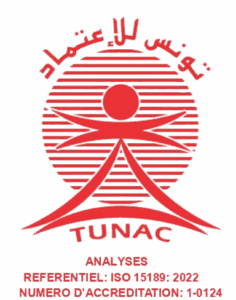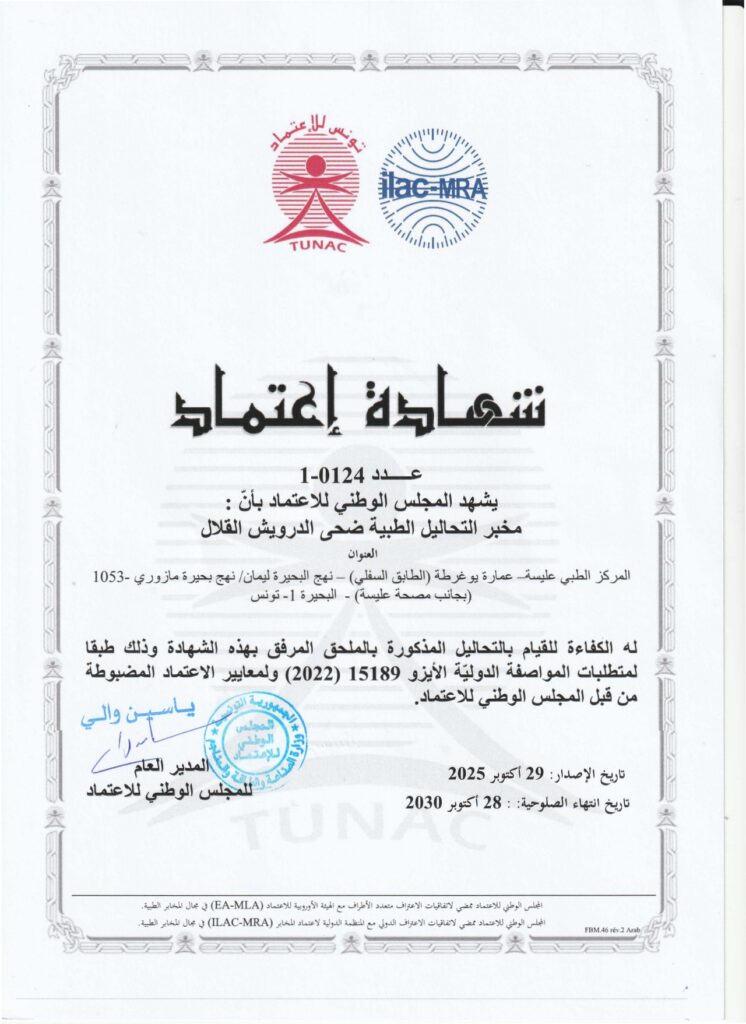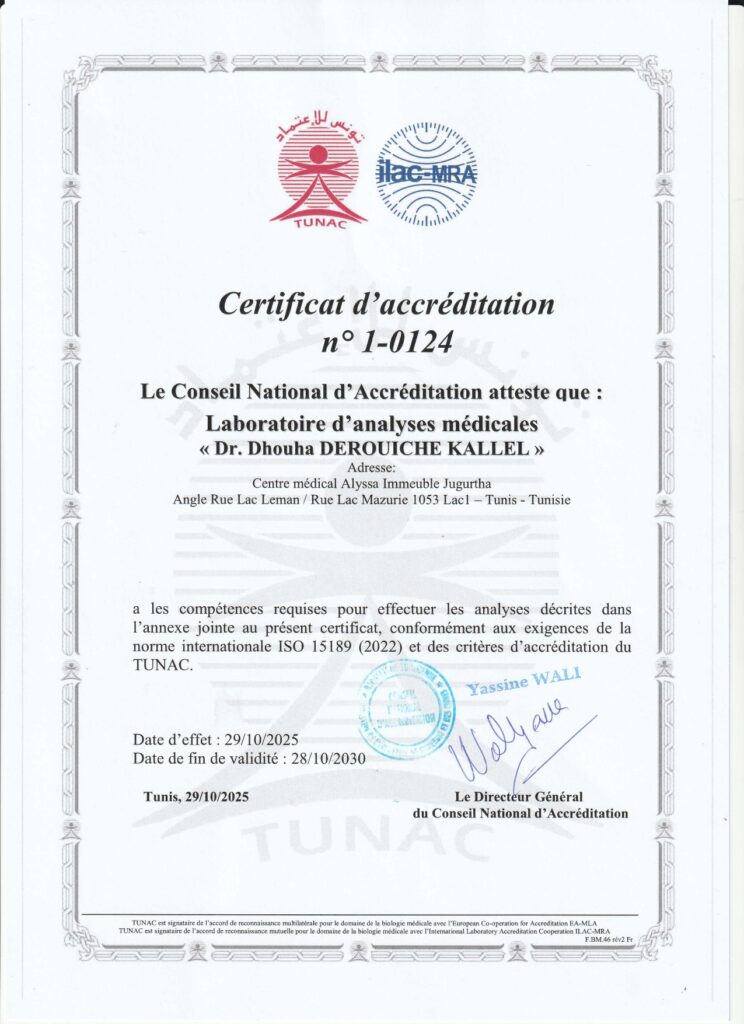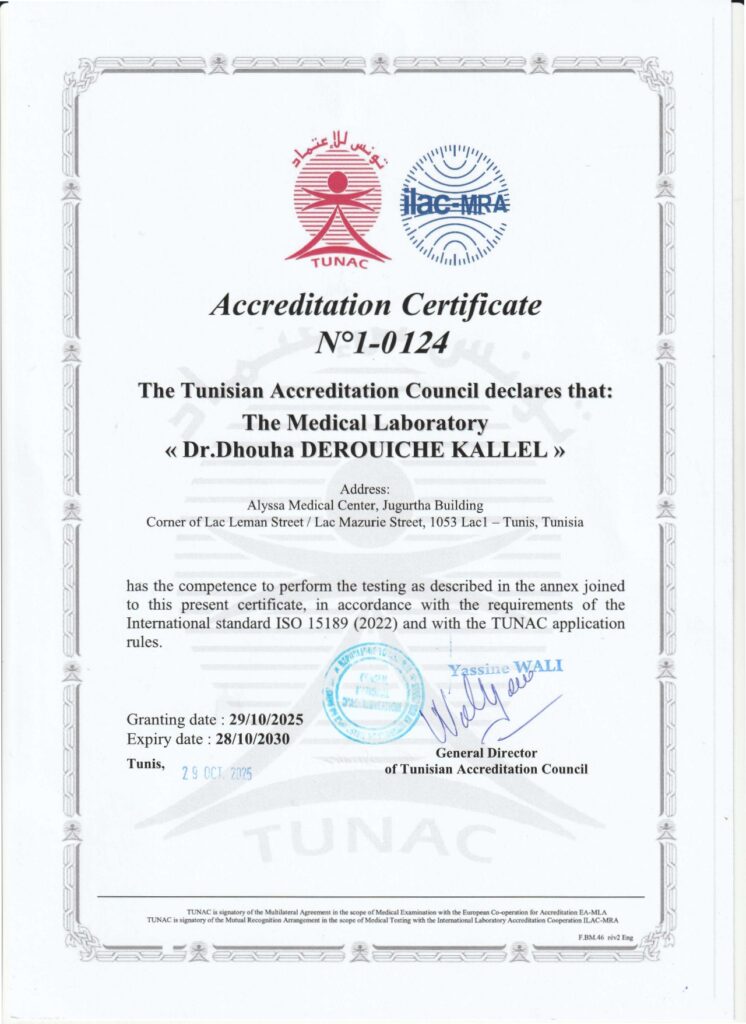
OUR HISTORY
Creation
Change of address
Commitment to the accreditation process
Aiming for accreditation

Notre laboratoire de biologie médicale est accrédité par le Conseil National
d’Accréditation TUNAC sous le certificat n° 1-0124, valable du 29/10/2025 au 28/10/2030.
Cette accréditation confirme la qualité, la fiabilité et la conformité de nos analyses selon
les normes internationales.



Our commitments
Commitment to quality

Ethical commitment

OUR AREAS OF ACTIVITY
- Biochemistry
- Haematology
- Hormonology
- Immunology
- Microbiology
- Molecular Biology

Biochemistry
Medical biochemistry involves analysing the chemical components present in blood and other body fluids (urine, CSF, etc.) to assess a patient's general health and diagnose various pathologies. These analyses measure the levels of substances such as electrolytes, enzymes, lipids, carbohydrates, proteins, etc.
- Lipid profile: Measurement of total cholesterol, LDL, HDL and triglycerides to assess the risk of cardiovascular disease.
- Glycaemia: Control of blood glucose levels to diagnose and monitor diabetes.
- Liver function: Tests to assess liver health, including liver enzymes (ALT, AST), bilirubin, etc.
- Renal function: Measurement of creatinine, urea and electrolytes to assess renal function.

Haematology
Haematology is the study of blood and the tissues that produce it. This field covers cellular haematology, immunohaematology and haemostasis, which enableTo assess blood disorders, anaemia, infections and other pathologies linked to blood cells.
- Blood cell count (CBC): Complete analysis of the different types of blood cells, including red blood cells, white blood cells and platelets.
- Prothrombin Time (PT) and Activated Cephalin Time (ACT): coagulation tests to assess the risk of bleeding or thrombosis.
- Blood grouping: Determination of blood group and Rhesus factor for transfusions and transfusion compatibility.

Hormonology
Hormone assays can be used to help diagnose endocrine dysfunctions and monitor the progress of pathologies and their treatment.
Marker assays are used to diagnose and monitor tumour pathologies.

Immunology
Medical immunology focuses on the study of the immune system and related diseases, such as allergies, autoimmune diseases and infections. Immunological tests are essential for assessing the body's immune response and diagnosing immune-related diseases.
- Serological tests: Detection of antibodies against various pathogens to diagnose past or present infections.
- Immunoglobulin assay (IgA, IgG, IgM): Assessment of immunoglobulin levels to diagnose immune deficiencies.
Allergy tests: Identification of the specific allergens that trigger allergic reactions in patients.
- Autoantibodies: Detection of autoantibodies to diagnose autoimmune diseases such as lupus or rheumatoid arthritis.

Microbiology
Microbiology is a discipline that brings together bacteriology, mycology and parasitology. It involves the study of bacteria, fungi and parasites that can cause disease in humans.
Bacteriological Cultures: Identification of bacteria responsible for infections and antibiotic sensitivity tests to determine the most effective treatment.
- Mycology: Identification of fungi and yeasts that can cause infections.
- Parasitology: Search for and identification of parasites in biological samples.

Molecular Biology
Molecular biology involves the analysis of nucleic acids (DNA and RNA) to diagnose genetic diseases, identify specific mutations and detect pathogens with a high degree of precision.
We produce :
- Viral load for hepatitis B and C and HIV, diagnosis of sexually transmitted infections, BK tests, diagnosis of whooping cough.
- Viral load for hepatitis B and C and HIV, diagnosis of sexually transmitted infections, BK tests, diagnosis of whooping cough.